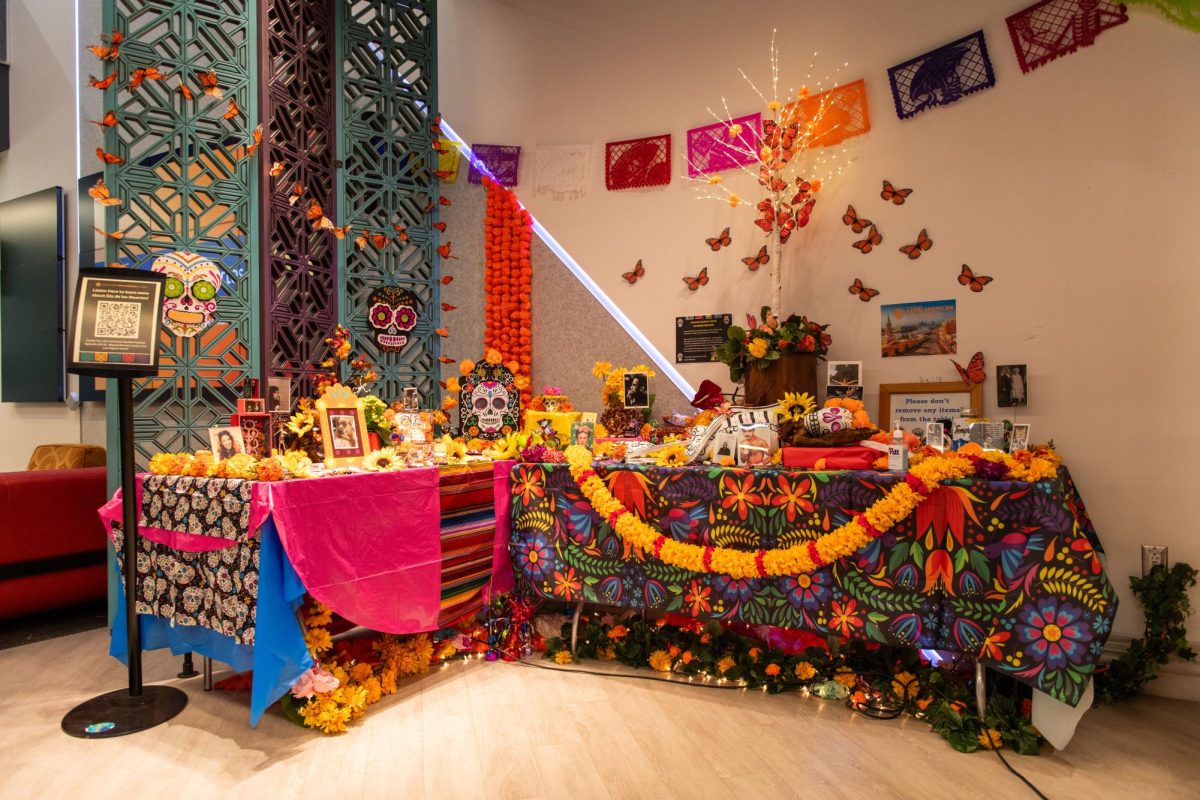Contrasting the blues, grays and whites of the Global Hub in Posvar Hall is an ofrenda, or traditional offering place for the Mexican holiday Día de los Muertos, Spanish for “Day of the Dead.” Bursting with color, the altar is adorned with sugar skulls, a “red carpet” of vibrant marigolds, monarch butterflies and photos honoring deceased people. Unlike many cultures, death is celebrated in Mexican culture, according to graduate pharmacy student Carla Medina-Gil.
“We all have someone who has passed away, someone who was close to us. In other cultures, people don’t really get to celebrate — it’s sad mourning,” Medina-Gil said. “In Mexican culture, we celebrate their passing and celebrate that they are going to a greater plane. We know that they are still with us with the ofrenda.”
Medina-Gil is the business manager of Pitt’s Latinx Student Association, who hosted the Día de los Muertos celebration in collaboration with Pitt’s Spanish Club and Center for Latin American Studies. LSA contributed traditional Mexican food, stickers and cookies to decorate with sugar skulls. Attendees could make papel picado, a colorful paper decoration, and enjoy the authentic food while learning about the significance of the holiday from Manuel Roman-Lacayo, the associate director of the Center for Latin American Studies.
The celebration took place on Wednesday, Nov. 1, during Día de Todos los Santos, or All Saints’ Day. Día de los Muertos was the next day but the colorful ofrenda will remain nestled in the Global Hub until Nov. 3. All are welcome to add their own photos or offerings.
Medina-Gil said participating in events like the Día de los Muertos celebration helps her feel closer to her family, despite being on the opposite side of the country.
“I’m originally from California where there’s a huge Latino and Mexican population, so I’m used to always celebrating my culture. When I came to Pittsburgh, there weren’t many Latin events,” Medina-Gil said. “To promote our culture and invite people to come and learn about it, it makes me feel like home.”
Medina-Gil said she remembers honoring her great-grandparents with offerings of their favorite foods — frijoles and fresh-baked bread for her great-grandmother and beer for her great-grandfather. Her family would decorate the ofrenda while her parents and grandparents told stories. You can honor any loved one on Día de los Muertos, Medina-Gil said, and she loves sharing the holiday with her non-Mexican friends.
“Many of the Latin American countries do not celebrate Día de los Muertos. I like to share my culture to the other Latinos that are in the LSA,” Medina-Gil said. “My friend, who’s from El Salvador, has a dog who has passed away. I tell her, you can celebrate your puppy, you can celebrate any loved one.”
Megan Hoke, a senior exercise science major and Spanish Club president, said while she doesn’t have a personal connection to Mexican culture, she enjoys attending informational events and immersive holiday celebrations.
“I think [this event] is very important — it tells you a lot about the culture of Latinx countries. I’ve always loved that about Spanish classes, when we took a day to learn about holidays,” Hoke said. “Every time we do an informational presentation I feel like I learn something new or something about how the holiday is celebrated. It’s most popular in Mexico, but it’s also celebrated in a lot of other Latinx countries, and so you learn about how other countries celebrate in different ways.”
As president of the Spanish Club, Hoke helps plan events that aim to improve the general body’s Spanish proficiency and expose them to Hispanic cultures, she said. The club welcomes students with and without personal connections to the culture, which Hoke said creates a valuable variety of participants.
“I think it’s great to have a mix in the club, which we usually have every year. It’s definitely good to hear from the people who are from the places we are learning about so we can hear their perspectives,” Hoke said.
The Global Hub hosts events that honor many international cultures, said Molly McSweeney, assistant director for student and community engagement in the Global Hub through the University Center for International Studies.
“[The Global Hub] is meant to be a space where programming and events happen with an international and global focus. We definitely want to engage students — it’s wonderful to see students at this event,” McSweeney said. “Anything that happens in the Global Hub is free and open to whoever passes by. There have been some very meaningful gatherings after world events or current events.”
Medina-Gil hopes the Día de los Muertos celebration sends a message of love and hope.
“Keep your loved ones close, and once they pass, just know you’ll see them on the other side,” Medina-Gil said.
A previous version of this story misspelled Manuel Román-Lacayo’s name and inaccurately described the Day of All Saints. The Day of All Saints is to honor those that are named saints by the church or who have died for their faith. This story has been updated. The Pitt News regrets these errors.


